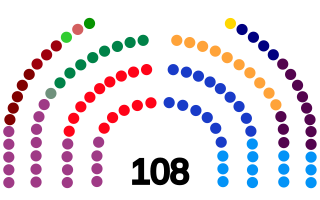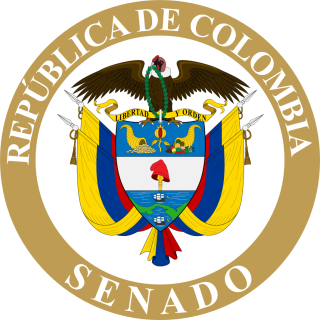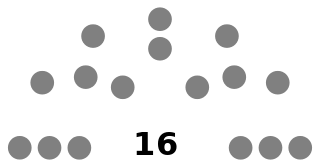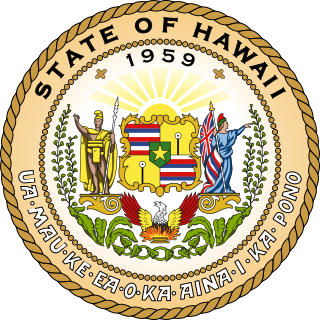
The politics of Palau take place in a presidential representative democratic republic, whereby the President of Palau is both head of state and head of government. Palau currently has no political parties and is a de facto non-partisan democracy although there is no law preventing the formation of political parties.

A member of parliament (MP) is the representative in parliament of the people who live in their electoral district. In many countries with bicameral parliaments, this term refers only to members of the lower house since upper house members often have a different title. The terms congressman/congresswoman or deputy are equivalent terms used in other jurisdictions. The term parliamentarian is also sometimes used for members of parliament, but this may also be used to refer to unelected government officials with specific roles in a parliament and other expert advisers on parliamentary procedure such as the Senate parliamentarian in the United States. The term is also used to the characteristic of performing the duties of a member of a legislature, for example: "The two party leaders often disagreed on issues, but both were excellent parliamentarians and cooperated to get many good things done."

The Congress of the Union, formally known as the General Congress of the United Mexican States, is the legislature of the federal government of Mexico. It consists of two chambers: the Senate of the Republic and the Chamber of Deputies. Its 628 members meet in Mexico City.

Palau has a bicameral legislature, the Palau National Congress, consisting of the House of Delegates and the Senate of Palau, which both sit at the capitol complex in Ngerulmud, Melekeok State. The House of Delegates has 16 members, each serving four-year terms in single-seat constituencies. The Senate has 13 members, also serving four-year terms in multi-seat constituencies. In the last elections, held in 2020, only non-partisans were elected; no political parties exist.

The Congress of the Republic of Colombia is the name given to Colombia's bicameral national legislature.

The Senate of the Republic of Colombia is the upper house of the Congress of Colombia, with the lower house being the Chamber of Representatives. The Senate has 108 members elected for concurrent (non-rotating) four-year terms.

The Chamber of Representatives is the lower house of the Congress of Colombia. It has 172 members elected to four-year terms.

Elections in Mexico are held every 6 years to elect a president and every 3 years to elect a legislature. These elections determine who, on the national level, takes the position of the head of state – the president – as well as the legislature.

Elections in Spain encompass four different types: general elections, regional elections, local elections, and elections to the European Parliament. General elections and regional elections are typically conducted at the conclusion of the national or regional legislative mandate, which usually spans four years since the previous election. However, early elections can be called in certain circumstances. On the other hand, local council elections and elections to the European Parliament follow fixed dates, although some local government bodies, such as provincial councils, are not directly elected. In most elections, a party-list proportional representation (PR) system is employed, while the Senate utilizes the plurality system.

The Dominican Republic is a unitary state with elected officials at the national and local levels. On a national level, head of state, the President, is elected directly by the people. The national legislature, the Congress of the Republic, is divided into two chambers: the Chamber of Deputies and the Senate. There are also elected offices at the local level. It is estimated that across the whole country, over four thousand offices are filled in every electoral cycle.

The Plurinational Legislative Assembly is the national legislature of Bolivia, placed in La Paz, the country's seat of government.

The National Assembly of Zimbabwe, previously the House of Assembly until 2013, is the lower house of the Parliament of Zimbabwe. It was established upon Zimbabwe's independence in 1980 as one of two chambers of parliament. Between the abolition of the Senate in 1989 and its reestablishment in 2005, the House of Assembly was the sole chamber of parliament.

The Senate of Palau is the upper house of the Palau National Congress. The Senate has 13 members serving four-year terms in multi-seat constituencies. No political parties exist. The most recent election was held on 3 November 2020.

The House of Delegates of Palau is the lower house of the Palau National Congress, Palau's bicameral legislature. The Senate of Palau is the upper house. The House of Delegates has 16 members, each serving four-year terms in single-seat constituencies. Each state represents one constituency. No political parties exist. The last election was held on 3 November 2020.

General elections were held in Palau on 4 November 2008 to elect the President and members of the National Congress. The presidential election was won by Johnson Toribiong. Incumbent President Tommy Remengesau was ineligible to run because he had served the maximum two consecutive terms allowed and announced that he would run for a seat in the Senate.

Elections in Hawaii are held for various local, state, and federal seats in the state of Hawaii. Regular elections are held every even year, although special elections may be held to fill vacancies at other points in time. The primary election is held on the second Saturday in August, while the general election is held on Election Day, which is the first Tuesday after the first Monday in November.

Parliamentary elections were held in Colombia on 9 March 2014 to elect members to both chambers of Congress. The nationwide constituency for the 102-member Senate was contested, as well as the 166 seats of the House of Representatives, plus the delegates to the Andean Parliament. There were 773 candidates for the Senate, 1,528 candidates for the House of Representatives, and 23 candidates for the five Colombian seats in the Andean Parliament. 32,795,962 Colombians had been registered to vote in the elections by the cut-off date of 25 January 2014.

General elections were held in Dominican Republic on 15 May 2016 to elect a president, vice-president and the Congress, as well as 20 deputies to the Central American Parliament, municipal councils, mayors and vice mayors. On 15 May 2015 Roberto Rosario, president of the Central Electoral Board, said that there would be about 4,300 seats up for election in the "most complex elections in history".

General elections were held in Palau on 1 November 2016 to elect a President and the National Congress. Incumbent President Tommy Remengesau was challenged by his brother-in-law, Surangel Whipps Jr. for the presidency, emerging as the top two in the primary elections on 27 September. Remengesau was subsequently re-elected with 51% of the vote.

General elections were held in Palau on 3 November 2020 to elect a President and the National Congress.

















